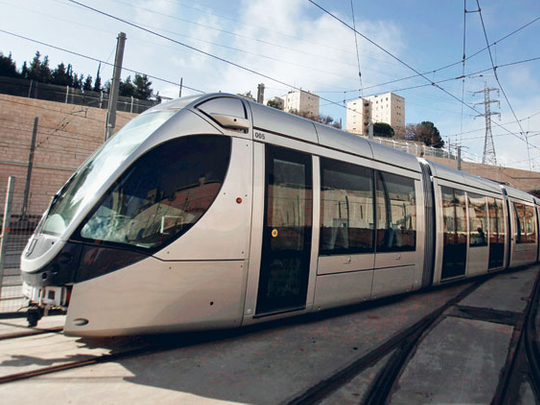
Occupied Jerusalem : Occupied Jerusalem's first light rail starts test runs this spring, with its sleek silver cars gliding across the city and promising to relieve the perpetual congestion.
But Palestinians see no reason to celebrate.
They hope to derail the $1 billion (Dh3.67 billion) tram because they fear it will further entrench Israeli control over occupied east Jerusalem, the part of the city they want as a capital. They've asked a French court to force two French multinationals, Veolia and Alstom, out of the project and are urging Arab countries to cancel contracts with the two companies.
The 14-kilometre line runs from west Jerusalem to the largest of several colonies Israel built in the occupied eastern sector.
Palestinians say Israel is creating more facts on the ground with the tram, just as it has with its ever-expanding Jewish colonies in occupied east Jerusalem that are now home to 180,000 Israelis.
"The purpose of this project is to make a bridge between the colonies ... and west Jerusalem and they use our land, Palestinian land," said Ahmad Rweidi, an adviser to Palestinian President Mahmoud Abbas. "The train is illegal and the colonies are illegal."
Israeli Prime Minister Benjamin Netanyahu says he's not willing to give up any part of occupied Jerusalem, taking a harder line than some of his predecessors, and insists Israel has the right to build anywhere in the city.
Government spokesman Mark Regev said "the light rail will serve all of [occupied] Jerusalem's residents and beyond, Arab and Jew alike."
The campaign against the train is part of a wider attempt by Palestinian activists and politicians to use new ways to challenge Israeli rule over the lands they want for a state. Frustrated by the failure of nearly two decades of peace talks, they are increasingly trying to hit Israel where it hurts — the pocketbook.
Palestinian security forces have been confiscating goods made in Jewish colonies from West Bank shops. Dozens of Palestinian grassroots groups have been orchestrating a "boycott Israel" campaign since 2005.
Apartheid comparison
Inspired by the anti-apartheid struggle in South Africa, they say they've gained momentum, particularly after the international outcry over Israel's war against Gaza's Hamas rulers last winter.
Israeli officials say the campaign has failed to dent Israel's economy and bristle at comparisons to apartheid-era South Africa. Jewish activists have been pushing back, branding the attempted boycott as anti-Semitic.
Bitter deadlock
The fight over the rail line comes amid an especially bitter deadlock over the fate of occupied Jerusalem. Netanyahu's refusal to stop colony construction in occupied east Jerusalem is one of the reasons Abbas won't resume peace talks that broke off more than a year ago.
But stopping the trains will be an uphill battle. Tracks have already been laid on most of the route, which will have 23 stations and link west Jerusalem with Pisgat Zeev, the largest Jewish colony in the occupied eastern sector. Forty-four cars are parked at a depot in occupied east Jerusalem, ready for a test phase that is to begin around March and last several months.
The Palestine Liberation Organisation has asked a French court to order Veolia and Alstom to drop out of the project, on grounds that it violates the Geneva Convention's prohibition of an occupier changing the nature of occupied lands.
The two firms are members, along with Israeli companies, of the City Pass consortium which is building the rail line and is to operate it until 2036.
The court ruled in December that it has jurisdiction, but has not set a date for the next hearing.
Do you think any action will be taken to address the Palestinians' concern? Is the international community serious about resolving the Israel Palestine issue?












